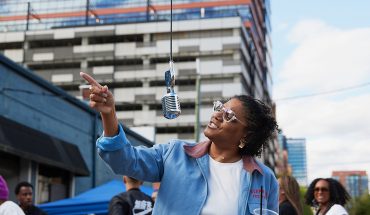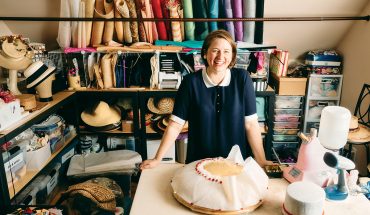Local adults and students share a desire to learn the language of computers in hopes for a career or life change.
by Addie Ladner | photography courtesy Code the Dream

It’s a Thursday night on Fayetteville Street in downtown Raleigh. While many people are drinking and eating their way through downtown, nearly 20 adults and high school students are sitting above the Foundation Bar at the American Underground Campus. These students come from minority, low-income, or immigrant backgrounds. All of them though, share a desire to learn the language of computers in hopes for a career or life change. Their teacher, Ramiro Rodriguez, is leading a conversation that sounds something like: “A equals C and case C is greater than case B.” They’re coding. Code the Dream is their solution, providing an alternative path to success for these students. Unlike careers in education, law, or medicine that require specific degrees, to be a computer programmer, you just need the skills. Originally a pilot project that began in 2015 under local nonprofit Uniting NC, Code the Dream teaches coding to high school students and young adults. Most of the program participants don’t have the means to attend college or are unable to find work. To date, the program has accepted students from more than 20 countries, including Nepal, India, Pakistan, Argentina, and Venezuela, and the in-depth, hands-on curriculum has produced hundreds of capable web and software developers in the Triangle area.
Daisy Magnus-Aryitey, 36, was once one of those students. She moved here from Ghana at age four. After seven years as a stay-at-home mom, Magnus-Aryitey had a hard time navigating the workforce. She joined Code the Dream and remembers not only her own world expanding, but her daughter’s world too. “My daughter always wanted to be a stay-at-home mom. I started to learn computer programming and her play shifted from cooking and baking to pretending she had an office with post-it notes and a computer,” she says. Magnus-Aryitey went on to be a full-time software developer at Duke University and is now the director at Code the Dream. She advocates for women, especially mothers and encourages them to consider a career in coding. When she started Code the Dream, it was the first time she remembers feeling comfortable with vulnerability. “As a minority, I had always been scared to be vulnerable. But we were all the same. I just knew it would change my life. There was no looking back,” she says. “The students we get don’t have a lot of resources. They’re willing to work so hard and are totally committed to the program and its mission.”
The program at Code the Dream begins with free coding classes in both Durham and Raleigh, starting with Ruby, where students learn the building blocks of computer programming skills. Students advance to more in-depth classes (Ruby on Rails) where they learn app development, JavaScript, HTML, and user interface. The top-performing students move on to Code the Dream Labs, where they’re paid a stipend to build web applications for local nonprofits and businesses. “It’s a win-win—the students get the experience they can use to launch a new career that’s life-changing for them and their families, and the work they’re doing in many cases benefits our community,” says Dan Rearick, executive director and co-founder of Code the Dream.
Crystal Williams-Brown now works as a full-time intern for Code the Dream Labs. At her high school in New Jersey, it was a big deal for students to graduate. She graduated, and went on to earn both a bachelors and an associate’s degree. Yet she still found it difficult to find a full-time job with decent pay. After joining Code the Dream, she’s transitioned from working at Lowe’s Foods to becoming a skilled coder. Williams-Brown is currently working on an app for Families Together, a local nonprofit that connects homeless people with transportation options. She didn’t think she was smart enough to ever be a coder, but her curiosity got the best of her. “If there’s an interest, take the dive,” she says to anyone who is reluctant to get started in coding. With an interest in gaming and schooling in animation, Williams-Brown took naturally to learning computer technology. “I was most surprised when I did my class; I recognized the logic, of computers. It made sense to me,” she says.
Manuel Ramos Gonzalez, 24, came to the U.S. from El Salvador when he was six years old. Due to his dedication to Code the Dream, he’s now in the software engineer apprenticeship at IBM. After finishing high school, Gonzalez planned to enroll in a four-year university. His plans changed as he wasn’t eligible for in-state tuition with his temporary protected status as a citizen (he now has his Green Card). He ended up with an associate’s degree and hoped to continue his education, but couldn’t afford to reconsider a four-year university. Thanks to Code the Dream, he had extensive skills, an impressive portfolio, and a fine-tuned resume which earned him the apprenticeship. “It was really a transformative experience for me,” he says. Fernando Ostoro, 23, is originally from Honduras and says Code the Dream was transformative for him as well. He’s now a software developer at Duke. “I enjoy what I do, it’s taught me a lot about logic. Now I see myself as a more logical person in every aspect of my life.” Ostoro enrolled in Code the Dream courses while getting his associate’s degree at a local community college. Along with another student, he developed an app for Student Action with Farmworkers (SAFW) called Conectate Carolina that helps farmworkers find resources in their area.
Rearick says that most tech companies today only employee a tiny fraction of black or Latino software developers and engineers. With Code the Dream’s help, however, that is slowly starting to change. “That’s a motivation for what we do. More technology has the possibility to make life better for us,” he says. During the Code the Dream class on Fayetteville Street, Rodriguez, who is a teacher as well as the organization’s co-founder, says something to his students that could simultaneously apply to their lives, not just their programming skills. “There are many different ways to find a solution, sometimes we stumble upon a more complicated one. Trust your gut, it will come with experience.”



